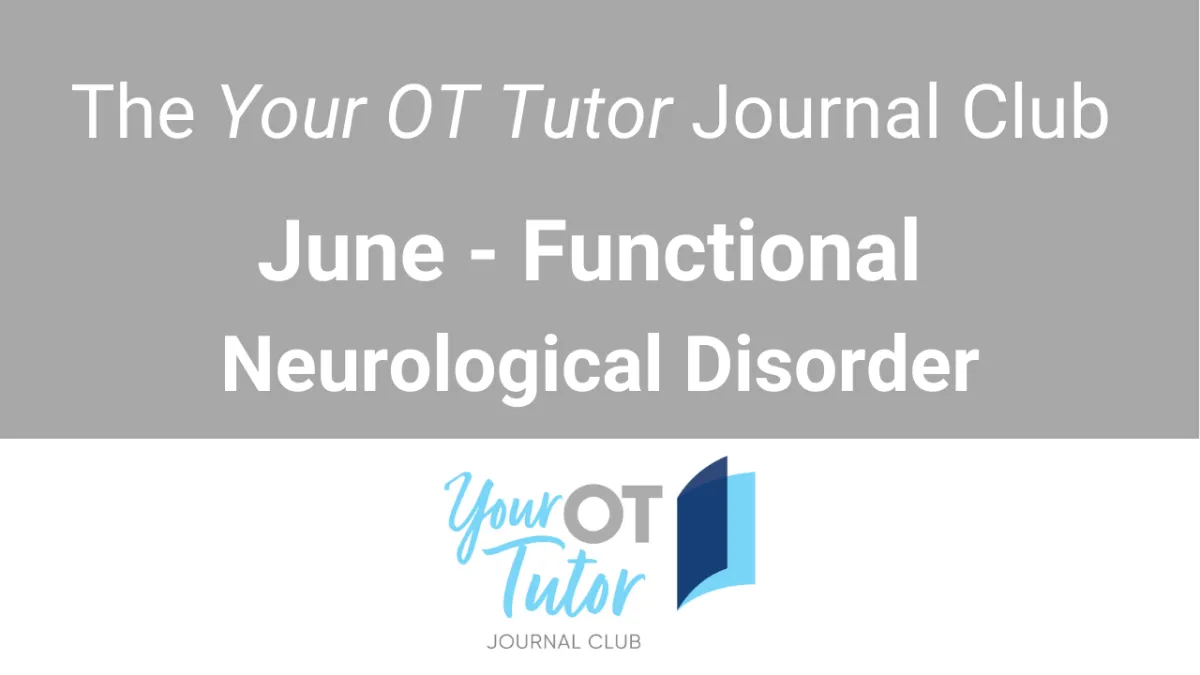
CPD for OTs - Functional Neurological Disorder
The Your OT Tutor Journal Club - The Journal Club you've been waiting for!

The details you need to know...
1. What article did we discuss? We reviewed and discussed a consensus article on the role of OT when working with people with Functional Neurological Disorder (FND). A Delphi study methodology was used to develop a set of recommendations regarding OT assessment and treatment approaches when working with adults with FND. Topics included prescribing equipment, addressing cognition, non-epileptic seizures, upper limb management and many more.
2. What ‘Research Fundamentals’ tip was covered in this session? We discussed an overview of the Delphi study methodology, including what it is, when it is used, and what the common steps of the process are.
3. What were the key points from the article critique? We used a modified version of the CREDES checklist for Delphi studies. While the study purpose was clear, and the use of a Delphi study was appropriate given the lack of research evidence on the role of OT with FND, there was a lack of information about other aspects of the methodology. It wasn’t clear how the expert panel was selected, only three countries were represented, and rather than staying as an anonymous process, this study included an open discussion and debate, which may introduce bias into the recommendations.
4. What were some of the key take home messages from the discussion? The person with FND’s understanding of their diagnosis has a significant impact on how we frame our assessment and treatment approach; OTs need to include education about the diagnosis and facilitate a self-management approach. Our assessment should focus on whole tasks rather than prompting individual movements that may lead the person to focus on their body and symptoms. We need to carefully consider the pros and cons of prescribing AT or other compensatory strategies, and have a plan to wean anything we introduce, especially in the early stages of the diagnosis.
5. How are OTs going to use what they learnt in this session? Some OTs were planning to spend more time exploring the client’s understanding of their diagnosis and framing their approach appropriately, while others were going to consider more factors when prescribing equipment. Others felt this session reinforced that they were on the right track with focusing on function rather than impairments with their assessments and treatments.
You can now purchase a recording of the session, along with a range of downloadable resources. Your access to this content won’t expire, so you can revisit it at any point in the future.
SOUND INTERESTING? SIGN-UP TODAY!
You'll get unlimited access to the content so you can revisit it whenever you need to.
If you are an OT student, my mission is to turn you into proud #OTNerds that love evidence-based practice and learning, so you can access this content for FREE! Click on the button below and send evidence of your student status and you'll be given access ASAP!
If you are an Occupational Therapist (or other interested health professional - all are welcome), click on the button below to make your purchase for $25. You'll receive immediate access to the preparation resources via the Your OT Tutor Learning Management System!
Turns out this session isn't for you, but you're still interested in being added to the Your OT Tutor mailing list? Add your details by clicking on the button below to stay up to date with the latest Your OT Tutor resources and courses.